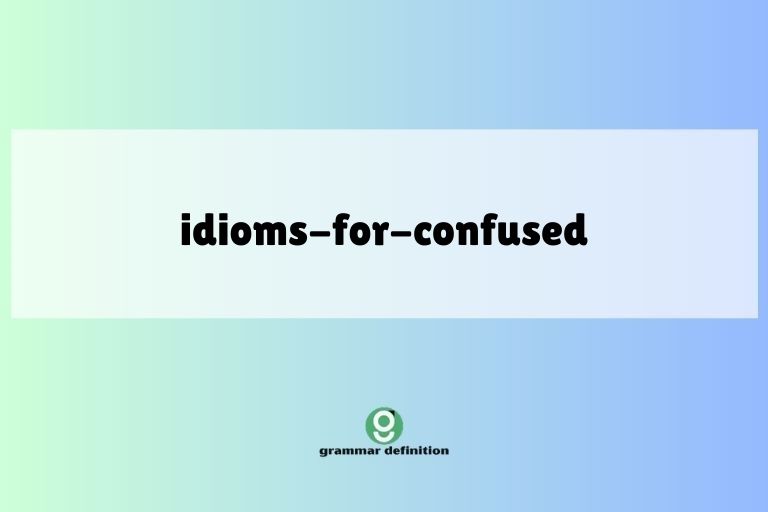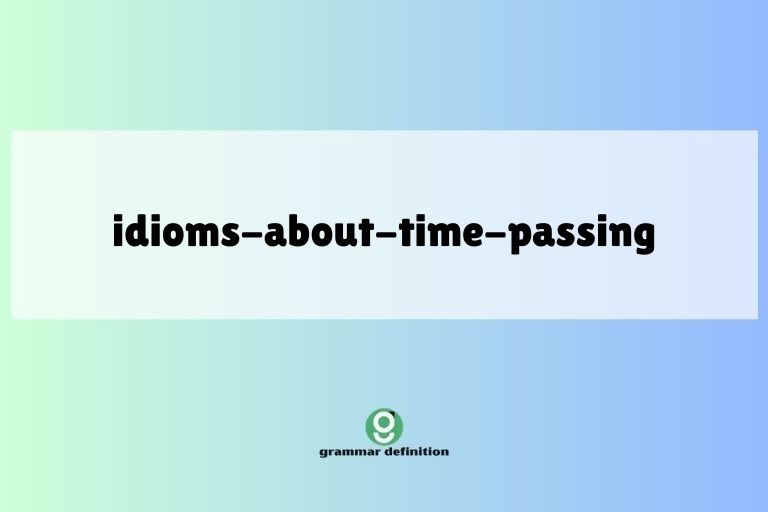Idioms for Confused: Mastering Everyday English Expressions

Understanding idioms is crucial for mastering the English language. Idioms add color and depth to communication, but they can be particularly challenging when they express confusion or uncertainty.
This article aims to provide a comprehensive guide to idioms related to confusion, helping you understand their meanings, usage, and nuances. By exploring these idioms, learners of all levels can enhance their comprehension and express themselves more effectively in English.
Table of Contents
- Introduction
- Definition of Idioms for Confused
- Structural Breakdown
- Types and Categories of Idioms for Confused
- Examples of Idioms for Confused
- Usage Rules for Idioms of Confusion
- Common Mistakes with Idioms for Confused
- Practice Exercises
- Advanced Topics: Nuances and Regional Variations
- FAQ: Frequently Asked Questions
- Conclusion
Introduction
Idioms are an integral part of the English language, adding richness and nuance to everyday conversations. However, they can be a source of confusion for language learners, especially when dealing with abstract concepts like confusion itself.
This article is designed to demystify idioms related to confusion, providing clear explanations, examples, and practical exercises. Whether you’re a beginner or an advanced learner, this guide will help you better understand and use these colorful expressions.
Definition of Idioms for Confused
An idiom is a phrase or expression whose meaning cannot be understood from the literal meanings of its individual words. Instead, it has a figurative meaning that is known through common use.
Idioms related to confusion specifically describe states of uncertainty, bewilderment, or lack of understanding. These idioms often employ metaphorical language to convey the feeling of being lost, disoriented, or puzzled.
Classification
Idioms for confused can be classified based on the type of imagery they invoke. Some common categories include:
- Spatial Confusion: Idioms that use spatial metaphors to describe confusion, such as “lost in the woods.”
- Mental Fog: Idioms that compare confusion to a fog or haze obscuring clear thinking, such as “in a fog.”
- Disorientation: Idioms that suggest a lack of direction or bearings, such as “not knowing whether one is coming or going.”
- Inability to Understand: Idioms that directly express a lack of comprehension, such as “it’s all Greek to me.”
Function
The primary function of idioms for confused is to express a state of uncertainty or lack of understanding in a vivid and engaging way. They can add emphasis, humor, or emotional depth to communication.
Using idioms correctly can also make your speech sound more natural and fluent.
Contexts
Idioms for confused can be used in a wide range of contexts, from informal conversations to formal writing. However, it’s important to consider the audience and the tone of the communication.
Some idioms may be more appropriate for casual settings, while others may be suitable for more formal situations. Understanding the nuances of each idiom is crucial for using them effectively.
Structural Breakdown
Idioms, by nature, defy typical grammatical rules because their meaning is not derived from the individual words but rather from the phrase as a whole. However, understanding the structural components can still be helpful.
Fixed Expressions
Many idioms are fixed expressions, meaning the words and their order cannot be changed without altering or destroying the idiom’s meaning. For example, “in the dark” cannot be changed to “in the light” without completely changing the intended meaning.
Metaphorical Components
Most idioms contain metaphorical components. Understanding the underlying metaphor can help you grasp the idiom’s meaning. For example, “to be in a fog” uses the metaphor of a dense fog obscuring vision to represent mental confusion.
Grammatical Structure
While the meaning is figurative, idioms still adhere to basic grammatical structures. They can function as:
- Adjectives: describing a state of confusion (e.g., “I was at sea about the instructions.”)
- Verbs: expressing the action of becoming confused (e.g., “I drew a blank when he asked me the question.”)
- Adverbs: modifying how something is done in a confused manner (e.g., “He answered in a daze.”)
Types and Categories of Idioms for Confused
Idioms for expressing confusion can be grouped into several categories based on their underlying imagery and meaning. Here are some common types:
Spatial Confusion
These idioms use spatial metaphors to describe a state of being lost or disoriented.
Mental Fog
These idioms compare confusion to a fog or haze that obscures clear thinking.
Disorientation
These idioms suggest a lack of direction or inability to find one’s bearings.
Lack of Understanding
These idioms directly express an inability to comprehend something.
Examples of Idioms for Confused
The following tables provide examples of idioms for confused, categorized by type, along with their meanings and example sentences. These examples will help you understand the context and usage of each idiom.
Spatial Confusion Examples
This table illustrates idioms that use spatial metaphors to describe a state of being lost or disoriented.
| Idiom | Meaning | Example Sentence |
|---|---|---|
| At sea | Confused or uncertain | I’m completely at sea with these new regulations. |
| Lost in the woods | Confused and unable to understand something | He got lost in the woods trying to follow the complicated instructions. |
| Off track | Diverted from the correct course or understanding | The discussion went off track, and I couldn’t follow the main point. |
| Out of my depth | In a situation that is too difficult to handle | I was out of my depth in the advanced physics class. |
| All over the place | Disorganized, confused, or scattered | His thoughts were all over the place, making it hard to understand him. |
| Going around in circles | Engaged in a repetitive and unproductive activity | We’re going around in circles trying to solve this problem. |
| In a maze | Feeling trapped and confused by a complex situation | Navigating the bureaucracy felt like being in a maze. |
| Taken aback | Surprised and confused by something unexpected | I was taken aback by her sudden outburst. |
| Left field | Unexpected or unconventional | That question came completely out of left field. |
| Not know which way is up | Completely disoriented and confused | After the accident, he didn’t know which way was up. |
| Sideways | Confused or not understanding | The explanation went completely sideways. |
| In the dark | Uninformed or unaware of something | They kept me in the dark about their plans. |
| Out of the loop | Not part of a group or conversation | I felt out of the loop because I missed the last meeting. |
| Miles away | Distracted and not paying attention | He seemed miles away during the presentation. |
| Off the beaten path | Unconventional or not well-known | The solution was a little off the beaten path. |
| Gone astray | Lost or gone wrong | The original plan had gone astray. |
| All mixed up | Confused or disorganized | My notes are all mixed up. |
| In a tangle | In a complicated or confusing situation | I’m in a tangle with these instructions. |
| Turned around | Confused or disoriented | I got completely turned around in the city. |
| At sixes and sevens | In a state of confusion and disarray | Everything is at sixes and sevens since the new manager arrived. |
| Lost the plot | To become confused and no longer understand what is happening | The movie lost the plot halfway through. |
| Come adrift | To become loose or separated, or to become confused or uncertain | The boat came adrift from its moorings. |
| Out of sync | Not coordinated or synchronized | The team was completely out of sync. |
Mental Fog Examples
This table includes idioms that compare confusion to a fog or haze that obscures clear thinking.
| Idiom | Meaning | Example Sentence |
|---|---|---|
| In a fog | Confused and disoriented | I’ve been in a fog since I woke up this morning. |
| Hazy | Unclear or vague | My memory of that night is hazy. |
| Clouded | Obscured or made unclear | His judgment was clouded by emotion. |
| Blanking out | Unable to remember something | I started blanking out during the exam. |
| Brain fog | A state of mental confusion and lack of focus | She struggled with brain fog after recovering from the illness. |
| Thick as mud | Difficult to understand | The instructions were as thick as mud. |
| Muddled | Confused or disorganized | His thoughts were muddled after the long journey. |
| Hazy recollection | A vague or unclear memory | I have only a hazy recollection of the event. |
| Mind is a blank | Unable to remember anything | My mind is a blank when I try to recall his name. |
| In a daze | Confused and bewildered | He wandered around in a daze after the accident. |
| Head in the clouds | Not paying attention to what is happening | She always has her head in the clouds. |
| Not seeing the wood for the trees | Being so focused on details that you miss the bigger picture | He’s not seeing the wood for the trees. |
| Can’t think straight | Unable to think clearly | I can’t think straight when I’m tired. |
| Light-headed | Feeling dizzy and confused | I felt light-headed after standing up too quickly. |
| Not all there | Not fully alert or aware | He seemed not all there this morning. |
| Dazed and confused | Confused and unable to think clearly | She was dazed and confused after the loud noise. |
| Lost for words | Unable to think of anything to say | I was lost for words when I heard the news. |
| Out of it | Not fully conscious or aware | He was completely out of it after the surgery. |
| A bit slow on the uptake | Slow to understand something | He’s a bit slow on the uptake sometimes. |
| Not firing on all cylinders | Not functioning at full capacity | I’m not firing on all cylinders today. |
| A screw loose | Slightly eccentric or crazy | He seems to have a screw loose. |
| Have a senior moment | A temporary lapse in memory | I’m having a senior moment; I can’t remember her name. |
Disorientation Examples
This table provides idioms that suggest a lack of direction or an inability to find one’s bearings.
| Idiom | Meaning | Example Sentence |
|---|---|---|
| Not knowing whether one is coming or going | Extremely confused and disoriented | I’m so busy I don’t know whether I’m coming or going. |
| Head spinning | Feeling dizzy and confused | My head is spinning after that long meeting. |
| Reeling | Feeling shocked and disoriented | I was still reeling from the unexpected news. |
| Knocked for six | Greatly shocked or upset | The news knocked her for six. |
| Like a deer in headlights | Paralyzed with fear or confusion | He stood there like a deer in headlights when he was asked the question. |
| All shook up | Emotionally disturbed or confused | She was all shook up after the incident. |
| In a spin | Confused and agitated | He was in a spin trying to meet the deadline. |
| In a whirl | Confused and busy | My life is in a whirl right now. |
| Sent for a loop | Confused or disoriented | The unexpected change sent me for a loop. |
| Lost the thread | Lost the train of thought | I lost the thread of the conversation. |
| Taken by surprise | Surprised unexpectedly | I was taken by surprise by the announcement. |
| Blown away | Overwhelmed or greatly impressed | I was blown away by the performance. |
| Stunned | Shocked or surprised | I was stunned by the news. |
| Flabbergasted | Surprised or astonished | I was flabbergasted by his behavior. |
| Baffled | Confused or puzzled | I was baffled by the instructions. |
| Perplexed | Confused or puzzled | I felt perplexed by the complex problem. |
| Bewildered | Confused or puzzled | I was bewildered by his sudden change in attitude. |
| Discombobulated | Confused or disoriented | I felt completely discombobulated after waking up. |
Lack of Understanding Examples
This table provides idioms that directly express an inability to comprehend something.
| Idiom | Meaning | Example Sentence |
|---|---|---|
| It’s all Greek to me | Impossible to understand | The technical jargon in the manual is all Greek to me. |
| Can’t make head nor tail of it | Unable to understand something at all | I can’t make head nor tail of these instructions. |
| Doesn’t ring a bell | Doesn’t sound familiar | That name doesn’t ring a bell. |
| Drawing a blank | Unable to remember something | I’m drawing a blank; I can’t remember her name. |
| Beats me | I don’t know | Beats me why he did that. |
| No clue | No idea | I have no clue what you’re talking about. |
| Beyond me | Too difficult to understand | The concept of quantum physics is beyond me. |
| Over my head | Too difficult to understand | The lecture was over my head. |
| Not have a clue | Not know anything | I don’t have a clue about car repairs. |
| Not get it | Not understand | I just don’t get it. |
| Missing something | Not understanding something | I feel like I’m missing something. |
| Out to lunch | Not paying attention or understanding | He’s completely out to lunch. |
| Incomprehensible | Impossible to understand | His explanation was completely incomprehensible. |
| Unfathomable | Impossible to understand | The reasons for his decision are unfathomable. |
| Puzzled | Confused or bewildered | I was puzzled by his reaction. |
| Foggiest idea | No idea at all | I don’t have the foggiest idea. |
| Not following | Not understanding | I’m not following you. |
| Lost me there | Confused by what was just said | You lost me there; can you explain that again? |
| Dodgy | Suspicious or unreliable | That sounds a bit dodgy to me. |
| Blank face | An expressionless face showing no understanding | He gave me a blank face when I asked the question. |
Usage Rules for Idioms of Confusion
Using idioms correctly involves understanding their specific meanings and contexts. Here are some rules to keep in mind:
Contextual Appropriateness
Consider the context in which you are using the idiom. Some idioms are more appropriate for informal settings, while others are suitable for formal situations. For example, “beats me” is very informal, while “I am at sea” can be used in more formal contexts.
Grammatical Structure Rules
While idioms are fixed expressions, they must still fit into the grammatical structure of the sentence. Ensure that the idiom functions correctly as a noun, verb, adjective, or adverb, as required by the sentence.
Word Order
The word order in an idiom is usually fixed. Changing the order can alter the meaning or make the idiom nonsensical. For example, “in a fog” cannot be changed to “a fog in.”
Literal vs. Figurative Meaning
Always remember that idioms have a figurative meaning. Avoid interpreting them literally, as this will lead to misunderstanding. For example, “it’s all Greek to me” doesn’t mean the speaker is literally hearing the Greek language; it means they don’t understand what’s being said.
Common Mistakes with Idioms for Confused
Here are some common mistakes that learners make when using idioms for confused:
Literal Interpretation
Mistake: Interpreting the idiom literally instead of understanding its figurative meaning.
Correct: “I’m at sea” means “I’m confused,” not literally being on the ocean.
Incorrect: “He is lost in the woods, therefore, he needs a map.”
Incorrect Word Order
Mistake: Changing the word order of the idiom.
Correct: “I can’t make head nor tail of it.”
Incorrect: “I can’t make tail nor head of it.”
Using in Wrong Context
Mistake: Using an idiom in an inappropriate context.
Correct: “Beats me why he did that” (informal).
Incorrect: “It beats me, esteemed colleagues, why the project failed” (in a formal presentation).
Overusing Idioms
Mistake: Using too many idioms in a short space, which can sound unnatural.
Correct: Using idioms sparingly to add color to your language.
Incorrect: “I was all over the place, completely at sea, and it was all Greek to me!”
Practice Exercises
Test your understanding of idioms for confused with these exercises. Choose the correct idiom to complete each sentence.
Exercise 1
Complete the following sentences with the correct idiom.
| Question | Options | Answer |
|---|---|---|
| 1. I tried to understand the lecture, but it was ______. | a) over my head, b) under my feet, c) beside my head | a) over my head |
| 2. After the accident, he didn’t ______. | a) know which way to look, b) know which way was up, c) know which way to turn | b) know which way was up |
| 3. I have ______ what you’re talking about. | a) no clue, b) no hint, c) no idea | a) no clue |
| 4. She’s always ______, dreaming about other things. | a) head in the clouds, b) feet on the ground, c) hand in the air | a) head in the clouds |
| 5. I’m ______ with these new software updates. | a) at sea, b) on land, c) in the air | a) at sea |
| 6. He was completely ______ after staying up all night. | a) out of it, b) into it, c) around it | a) out of it |
| 7. I ______ when I try to remember her name. | a) draw a blank, b) write a blank, c) see a blank | a) draw a blank |
| 8. The technical jargon ______ to me. | a) is all Greek, b) is all Latin, c) is all French | a) is all Greek |
| 9. I’m so busy, I don’t ______. | a) know if I’m coming or going, b) know when I’m coming or going, c) know where I’m coming or going | a) know if I’m coming or going |
| 10. The news ______ for six. | a) knocked me, b) hit me, c) threw me | a) knocked me |
Exercise 2
Choose the idiom that best fits the context of the sentence.
| Question | Options | Answer |
|---|---|---|
| 1. The instructions were so complicated that I couldn’t ______. | a) make head nor tail of them, b) see the forest for the trees, c) bark up the wrong tree | a) make head nor tail of them |
| 2. After the surprise party, she was completely ______. | a) blown away, b) under the weather, c) on cloud nine | a) blown away |
| 3. He seemed a bit ______ during the meeting; he wasn’t making much sense. | a) out to lunch, b) full of beans, c) in the know | a) out to lunch |
| 4. I’m completely ______ about what happened at the conference. | a) in the dark, b) in the know, c) on the ball | a) in the dark |
| 5. Trying to solve this problem is like ______. | a) going around in circles, b) hitting the nail on the head, c) adding fuel to the fire | a) going around in circles |
| 6. That question came completely out of ______. | a) left field, b) right field, c) center field | a) left field |
| 7. Don’t ask me; ______. | a) beats me, b) asks him, c) tells her | a) beats me |
| 8. With so many projects going on, my thoughts are ______. | a) all over the place, b) in a row, c) on the same page | a) all over the place |
| 9. The speaker ______ halfway through the presentation, and the audience was confused. | a) lost the plot, b) found the plot, c) made the plot | a) lost the plot |
| 10. I felt completely ______ after the rollercoaster ride. | a) discombobulated, b) energized, c) calm | a) discombobulated |
Advanced Topics: Nuances and Regional Variations
For advanced learners, it’s important to recognize that idioms can have subtle nuances and may vary regionally.
Subtle Nuances
Some idioms have subtle nuances that can only be understood through extensive exposure to the language. For example, the difference between “in a fog” and “in a daze” is subtle but significant. “In a fog” suggests a general lack of clarity, while “in a daze” implies a more disoriented state.
Regional Variations
Idioms can also have regional variations. An idiom that is common in one English-speaking country may be unfamiliar or have a different meaning in another. For example, some idioms are more common in British English than in American English, and vice versa.
Historical Context
Understanding the historical context of an idiom can also enrich your understanding. Many idioms have their origins in historical events, customs, or literature. Knowing the history behind an idiom can provide deeper insight into its meaning and usage.
FAQ: Frequently Asked Questions
Here are some frequently asked questions about idioms for confused:
- What is the best way to learn idioms?
The best way to learn idioms is through exposure and practice. Read widely, listen to native speakers, and try to use idioms in your own speech and writing. Keep a notebook of new idioms and review them regularly.
- How can I avoid misusing idioms?
To avoid misusing idioms, make sure you understand their specific meanings and contexts. Pay attention to how native speakers use them and avoid making assumptions based on the literal meanings of the words. When in doubt, look up the idiom in a dictionary or ask a native speaker for clarification.
- Are there any resources that can help me learn idioms?
Yes, there are many resources available, including dictionaries of idioms, online idiom lists, and language learning apps. Look for resources that provide clear definitions, examples, and practice exercises.
- How important is it to learn idioms?
Learning idioms is crucial for achieving fluency in English. While you can communicate effectively without using idioms, understanding them will greatly enhance your comprehension and make your speech sound more natural and fluent. It will also help you understand cultural references and humor.
- Should I try to use idioms in formal writing?
Whether you should use idioms in formal writing depends on the specific context and tone. In general, it’s best to avoid using overly casual or colloquial idioms in formal writing. However, some idioms can be appropriate if they add clarity or emphasis to your writing.
- How can I tell if an expression is an idiom?
If the meaning of a phrase is different from the literal meanings of its individual words, it is likely an idiom. Also, idioms are often used in a figurative or metaphorical way.
- What should I do if I don’t understand an idiom?
If you don’t understand an idiom, ask for clarification. You can ask the speaker to explain the idiom or look it up in a dictionary. Don’t be afraid to admit that you don’t understand something; it’s better to ask than to misunderstand.
- Are there any idioms that should be avoided?
Some idioms may be considered offensive or inappropriate in certain contexts. Be mindful of your audience and avoid using idioms that could be hurtful or disrespectful. When in doubt, choose a more neutral expression.
Conclusion
Mastering idioms for confused is an essential step in achieving fluency and understanding the nuances of the English language. By understanding the definitions, structural elements, and usage rules of these idioms, you can express yourself more effectively and confidently.
Remember to practice regularly, pay attention to context, and don’t be afraid to ask for clarification. With dedication and effort, you can navigate the world of English idioms with ease.






